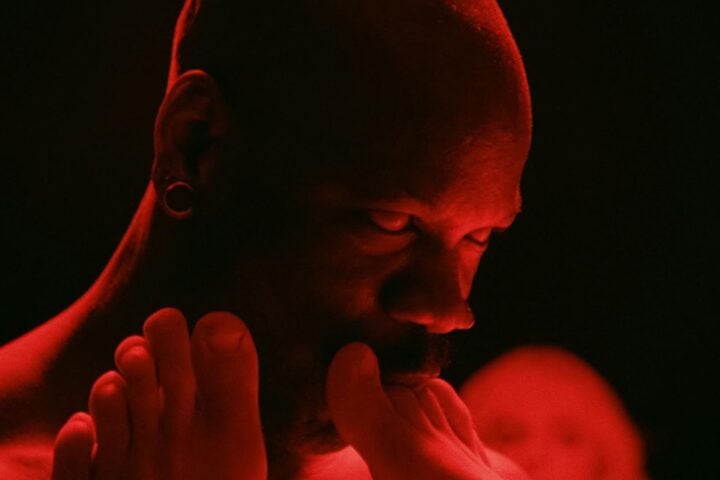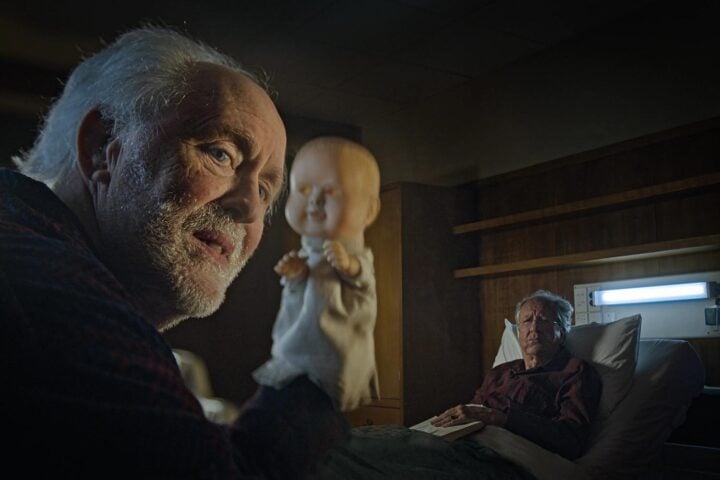Atom Egoyan’s Seven Veils concerns the return of the repressed against the backdrop of Canadian modern life. Though Egoyan’s eerie and uncanny films rarely embrace outright surrealist logic, conventionalities of plot, dialogue, and structure tend to take secondary importance to more cerebral musings on the primal lusts, fears, and compulsions of the human psyche and culture as byproduct of those violent internal forces. It’s an unabashedly intellectual bent that the filmmaker sometimes pursues at the cost of dramatic legibility.
Seven Veils is a metatextual hall of mirrors informed by Egoyan’s theater production of Richard Strauss’s opera Salome, which he revived in 2023 after previous runs in 1996 and 2002, and the film uses sets, footage, and personnel from that production. Jeanine (Amanda Seyfried), an ambitious opera director taking over the production of Salome from her late mentor and lover, sees the opera’s sordid narrative of soiled innocence, incestuous abuse, sexual exploitation, and unrequited desire as a direct reflection of traumatic events in her own life.
These events are fragmentarily revealed throughout Seven Veils in disturbing flashbacks, shot on turn-of-the-century DV cameras, that show a young Jeanine’s father instructing her in his vision of “perfect” performances of femininity, youth, and dance. Further, Jeanine is haunted by the feeling that her beloved mentor, the production’s original director, appropriated and misrepresented her trauma through certain artistic choices in the production’s staging. She seeks to correct and reclaim these aesthetics by taking on the mantle of director—until the open wounds driving her creative vision threaten to compromise her own professionalism.
The film contains a #MeToo subplot in which the behavior of a star opera singer (real-life opera singer Michael Kupfer-Radley) sends destabilizing ripples through the production company’s rigid hierarchy. It’s a functional extension of the film’s themes—of gender, power, recording technologies, and the blurring of professional boundaries in the world of artistic production—and gives a fuller sense of the backstage politics that bring a theater production to fruition.
But that subplot also flirts with obviousness and familiarity in a media landscape that’s already wrung just about every thoughtful observation out of the reckoning with the abuses of power by individuals in liberal arts institutions. Much like Jeanine’s equally ripped-from-the-headlines encounters with an “invasive” podcaster, Charlie (Joey Klein), it feels like an awkward appendage on the abstract, introverted psychodrama at the core of the film.
Seven Veils abounds in myriad thematic swings tied loosely to one another through echoes and rhymes—ambiguous, provocative connections between people, artworks, history, current events, and the rituals of alienated modern life. Perhaps inevitably, it invites comparison to Tár. Todd Field’s film, though, boasts a tighter-wound narrative and more playful dialogue. Seven Veils comes from a place of more authentic involvement in its classical theater setting, but it’s also less witty and dynamic as a drama. Its pleasures are ultimately more textural and academic.
Since 2001, we've brought you uncompromising, candid takes on the world of film, music, television, video games, theater, and more. Independently owned and operated publications like Slant have been hit hard in recent years, but we’re committed to keeping our content free and accessible—meaning no paywalls or fees.
If you like what we do, please consider subscribing to our Patreon or making a donation.





